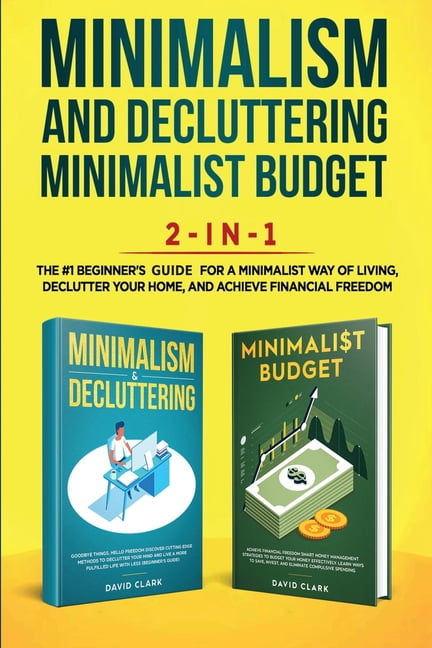
Are you feeling overwhelmed with your finances? Are you constantly surrounded by clutter and struggling to make sense of it all? Look no further! Discover the power of minimalism and how it can transform not only your living space but also your financial well-being. In this article, we will explore the concept of minimalism and its impact on decluttering your finances. Whether you’re drowning in debt or simply want to simplify your financial priorities, minimalism offers a fresh perspective and practical strategies to help you regain control and find peace of mind. So, grab a cup of tea, sit back, and let’s explore how minimalism can declutter your finances.

Table of Contents
Understanding Minimalism
Defining minimalism
Minimalism is a lifestyle and mindset that focuses on intentionally simplifying and decluttering various aspects of one’s life, including finances. It involves letting go of excessive material possessions, unnecessary expenses, and financial clutter in order to create more space for what truly matters. At its core, minimalism is about prioritizing quality over quantity, fostering a sense of contentment, and finding fulfillment in the essentials rather than the excess.
The benefits of minimalism
Embracing minimalism in your financial life can bring about numerous benefits. By eliminating unnecessary expenses, you can free up more resources to allocate towards meaningful goals, such as saving for the future or pursuing your passions. Minimalism also leads to a reduced financial burden, as you no longer feel the pressure to constantly acquire more material possessions. Furthermore, a minimalist approach can help you gain a clearer perspective on your financial priorities, increase mindfulness in spending decisions, and ultimately lead to greater financial freedom and peace of mind.
Applying Minimalism to Your Finances
Assessing your current financial situation
Before embarking on your minimalist financial journey, it’s crucial to assess your current financial situation. Take the time to review your income, expenses, debts, and savings. This will provide you with a clear overview of your financial health and enable you to make informed decisions moving forward. As you assess your finances, consider your financial goals, your values, and what truly brings you joy and fulfillment in life.
Identifying unnecessary expenses
Once you have a comprehensive understanding of your finances, it’s time to identify and eliminate unnecessary expenses. Start by examining your spending habits and identifying any areas where you may be overspending or indulging in non-essential purchases. Consider cutting back on discretionary spending such as eating out, entertainment subscriptions, or shopping for items that you don’t truly need. By being mindful of your spending and focusing on what truly adds value to your life, you can free up more financial resources and eliminate financial clutter.
Creating a Minimalist Budget
Tracking your income and expenses
A crucial step in implementing a minimalist approach to your finances is tracking your income and expenses. This involves diligently documenting all sources of income and keeping a record of every expenditure. This helps you gain a clear picture of where your money is going and enables you to make informed decisions about your spending habits. There are various tools and apps available that can simplify the tracking process and provide you with valuable insights into your financial habits.
Setting financial goals
Once you have a clear understanding of your income and expenses, it’s important to set financial goals. These goals will serve as a roadmap for your financial journey and help you stay motivated and focused. Whether your goals include saving for a down payment on a house, paying off debt, or building an emergency fund, make sure they align with your values and priorities. Setting realistic and measurable goals will allow you to track your progress and celebrate milestones along the way.
Eliminating debt
Debt can be a major source of financial stress and clutter. As part of your minimalist financial approach, prioritize eliminating debt. Start by organizing your debts and creating a repayment plan. Consider strategies such as the debt snowball method or the debt avalanche method to effectively tackle your debts. By reducing and eventually eliminating debt, you free up more financial resources and create space for saving and investing in your future.
Embracing Frugality
Adopting a minimalist lifestyle
Embracing a minimalist lifestyle goes beyond just decluttering your physical space; it also extends to your financial habits. Adopting a minimalist mindset means being intentional about your spending, making mindful choices, and valuing experiences over material possessions. It involves finding contentment in the essentials and recognizing that happiness and fulfillment are not tied to the accumulation of things. By embracing minimalism, you can reduce the desire for constant consumption and find greater satisfaction in a simpler way of living.
Reducing materialistic desires
In a society that often equates happiness and success with owning more, resisting materialistic desires can be challenging. However, embracing minimalism involves consciously challenging these societal norms and reevaluating our own desires. Take the time to reflect on what truly brings you joy and fulfillment, and question whether the items you desire align with your values and priorities. By reducing materialistic desires, you can redirect your financial resources towards experiences, personal growth, and building a secure future.
Avoiding impulse buying
Impulse buying is a common habit that can quickly lead to financial clutter and regret. To avoid falling into this trap, cultivate mindfulness in your spending habits. Before making a purchase, take a moment to pause and consider whether it aligns with your financial goals and brings true value to your life. Practice the 24-hour rule, where you wait a day before making non-essential purchases. This allows you to reflect on whether the item is truly necessary or if it was merely a fleeting impulse.

Simplifying Your Financial Accounts
Consolidating accounts
Having numerous financial accounts can lead to unnecessary complexity and clutter. As part of your minimalist financial approach, consider consolidating your accounts. Review your bank accounts, credit cards, and investment accounts, and determine if you can simplify and streamline them. Consolidating accounts can make it easier to track your finances, reduce fees, and simplify your financial management.
Automating bill payments
Forgetting to make bill payments is not only inconvenient but can also result in late fees and damage your credit score. To simplify your financial life, automate your bill payments. Set up automatic payments for recurring expenses such as utilities, subscriptions, and loan repayments. This ensures that your bills are paid on time and frees up mental energy that can be directed towards more meaningful financial decisions.
Closing unused accounts
If you have financial accounts that are no longer serving you, consider closing them. Unused credit cards, bank accounts, or investment accounts can contribute to financial clutter and potential security risks. Before closing any accounts, ensure that there are no outstanding balances, and consider the impact on your credit score. By closing unused accounts, you can streamline your financial life and reduce unnecessary complexity.
Streamlining Your Investments
Simplifying your investment portfolio
When it comes to investments, simplicity can be key. Evaluate your investment portfolio and consider simplifying it by consolidating or diversifying your holdings. Having a cluttered and complicated investment portfolio can make it difficult to track performance and stay informed about your investments. By simplifying your portfolio, you can focus on the investments that align with your financial goals and reduce unnecessary complexity.
Optimizing your asset allocation
Asset allocation refers to the distribution of your investment portfolio across different asset classes, such as stocks, bonds, and cash. As part of your minimalist financial approach, review your asset allocation and ensure it aligns with your risk tolerance and long-term goals. Consider rebalancing your portfolio periodically to maintain your desired asset allocation. Optimizing your asset allocation can reduce the need for constant monitoring and rebalancing, allowing you to simplify your investment strategy.
Considering passive investing
Passive investing is a minimalist approach to investing that involves building a diversified portfolio and holding it for the long term. This approach minimizes the need for constant trading and monitoring of individual stocks or funds. Consider incorporating passive investment strategies, such as investing in low-cost index funds or exchange-traded funds (ETFs). Passive investing allows you to simplify your investing approach, reduce fees, and potentially achieve market returns over the long term.

Minimizing Financial Clutter
Organizing financial documents
Financial clutter can quickly accumulate in the form of documents, bills, receipts, and statements. As part of your minimalist financial journey, take the time to organize your financial documents. Create a system that works for you, whether it’s physical folders or digital storage. Categorize and label documents for easy retrieval when needed. Clearing the clutter and organizing your financial documents can save time, reduce stress, and ensure you have important information readily available.
Digitizing paper records
In today’s digital age, digitizing paper records can help declutter your financial life and improve accessibility. Consider scanning important documents such as tax returns, bank statements, and insurance policies, and store them securely on your computer or in the cloud. This eliminates the need for physical storage space and reduces the risk of documents getting lost or damaged. Digitizing your financial records not only saves space but also allows for easier searching and retrieval.
Using financial apps and tools
Take advantage of technology and utilize financial apps and tools to simplify your financial life. There are numerous apps available that can help you track your expenses, set budgets, monitor investments, and automate savings. Explore different options and find tools that align with your needs and preferences. By leveraging financial apps and tools, you can streamline your financial management and gain better insights into your financial habits.
Avoiding Overconsumption
Evaluating your needs versus wants
To avoid overconsumption, it’s essential to evaluate your needs versus wants. Before making a purchase, pause and ask yourself if it is something you truly need or if it is driven by a desire for instant gratification. By distinguishing between needs and wants, you can make more conscious spending decisions and avoid accumulating unnecessary possessions. Focus on acquiring items that serve a purpose and bring long-term value to your life.
Adapting a mindful spending approach
Practicing mindful spending involves being fully present and intentional in your purchasing decisions. Before making a purchase, take a moment to consider whether it aligns with your values, priorities, and financial goals. Ask yourself if the item will truly contribute to your overall well-being and if there are alternative ways to fulfill the same need. By adopting a mindful spending approach, you can break free from impulse buying and make choices that align with your minimalist financial mindset.
Purchasing experiences over possessions
As a minimalist, prioritize purchasing experiences over material possessions. Invest in activities and experiences that bring joy, personal growth, and lasting memories. Whether it’s travel, learning a new skill, or exploring your hobbies, focus on experiences that enrich your life rather than accumulating more things. By shifting the focus from possessions to experiences, you can find fulfillment in moments and relationships rather than in the accumulation of belongings.

Maximizing the Impact of Minimalist Habits
Maximizing savings through frugality
One of the main benefits of adopting a minimalist approach to your finances is the opportunity to maximize savings. By practicing frugality and being intentional in your spending choices, you can free up more financial resources to allocate towards your savings goals. Look for ways to reduce expenses, negotiate bills, and cut back on unnecessary purchases. Redirect the money saved towards building an emergency fund, investing for the future, or pursuing your passions.
Investing in experiences and personal growth
Instead of focusing solely on material possessions, invest in experiences and personal growth. Allocate a portion of your financial resources towards activities and opportunities that enhance your well-being and personal development. This could include attending workshops, taking courses, traveling, or participating in hobbies that bring you joy. Investing in experiences and personal growth not only enriches your life but also aligns with the minimalist ethos of finding value in the intangible.
Prioritizing financial independence
One of the ultimate goals of minimalism is achieving financial independence. By prioritizing financial independence, you are working towards a future where you have the freedom to make choices without being constrained by financial obligations. Determine your financial independence number, which is the amount of money required to cover your expenses without the need for traditional employment. Set milestones and develop a plan to achieve financial independence, whether it’s through saving, investing, or pursuing alternative income streams.
Maintaining Financial Discipline
Staying committed to your financial goals
Maintaining financial discipline requires staying committed to your financial goals. Keep your goals visible and regularly reassess them to ensure they still align with your values and priorities. Surround yourself with supportive individuals who understand and respect your minimalist financial journey. Remind yourself of the benefits of minimalism and the progress you’ve made towards a simpler, more fulfilling financial life. By staying committed to your goals, you can overcome challenges and continue to make meaningful progress.
Avoiding lifestyle inflation
Lifestyle inflation refers to the tendency to increase spending as income increases. As you experience financial success or salary increases, it’s important to resist the urge to succumb to lifestyle inflation. Rather than upgrading your lifestyle and increasing your expenses, strive to maintain a modest and intentional approach to your spending. By avoiding lifestyle inflation, you can continue to prioritize your financial goals and maintain a minimalist mindset regardless of external circumstances.
Continually reassessing your spending habits
Finally, maintaining financial discipline involves continually reassessing your spending habits. Regularly review your expenses and evaluate whether they align with your values, priorities, and financial goals. Look for areas where you can make further improvements and be open to adjusting your spending habits as needed. Your financial journey is a dynamic process, and as you grow and evolve, so should your approach to managing your finances. By continually reassessing your spending habits, you can ensure you are staying true to your minimalist financial principles.








